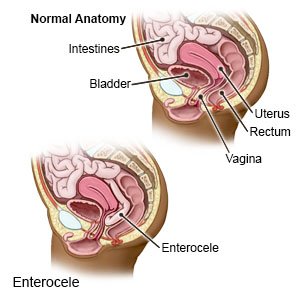Enterocele
Medically reviewed by Drugs.com. Last updated on Aug 4, 2025.
An enterocele happens when part of your small intestine falls down and bulges into your vagina. Weak or stretched muscles in the pelvis allow the intestine to prolapse (fall out of place). An enterocele may also be called a vaginal hernia or a small bowel prolapse.
 |
DISCHARGE INSTRUCTIONS:
Seek care immediately if:
- You have a mass bulging out of your vagina that you cannot push back into place.
- You vomit more than 2 times in a day.
- Your bowel movement is bright red or black.
Call your doctor or gynecologist if:
- Your pessary falls out.
- You have heavier vaginal bleeding than usual.
- You are not able to have a bowel movement.
- You have questions or concerns about your condition or care.
Manage or prevent an enterocele:
- Sit with your legs elevated. This can help relieve pain or discomfort. Put pillows or blankets under your lower legs to elevate your entire legs. Do not stand for long periods of time.
- Prevent pressure in your abdomen. Do not strain when you have a bowel movement. Do not lift heavy objects. Talk to your healthcare provider about treatment for a chronic cough. Vaping or smoking can cause or worsen a chronic cough. Ask your provider for information if you currently smoke or vape and need help to quit.
- Do Kegel exercises. These exercises strengthen the muscles that hold your uterus in place. They also tighten the muscles you use when you urinate or have a bowel movement. Tighten muscles in your pelvis (muscles you use to stop urinating). Hold the muscles tight for 5 seconds, then relax for 5 seconds. Gradually work up to holding the muscles contracted for 10 seconds. Do at least 3 sets of 10 repetitions a day.
- Maintain a healthy weight. Ask your healthcare provider for a healthy weight for you. Your provider can help you create a weight loss plan, if needed. Your provider can also help you create a physical activity plan. Physical activity, such as exercise, helps your bowels work better and decreases pressure inside your colon.

- Eat more fiber. High-fiber foods, such as fruits, vegetables, and whole grains, soften bowel movements. This helps bowel movements pass more quickly through your colon. Your provider may also recommend medicines to make it easier to have a bowel movement, or to make them more regular.

- Drink liquids as directed. Ask your provider how much liquid to drink each day and which liquids are best for you. Liquids will help decrease constipation so you will not strain to have a bowel movement.
Follow up with your doctor or gynecologist as directed:
Write down your questions so you remember to ask them during your visits.
© Copyright Merative 2025 Information is for End User's use only and may not be sold, redistributed or otherwise used for commercial purposes.
The above information is an educational aid only. It is not intended as medical advice for individual conditions or treatments. Talk to your doctor, nurse or pharmacist before following any medical regimen to see if it is safe and effective for you.
Further information
Always consult your healthcare provider to ensure the information displayed on this page applies to your personal circumstances.
